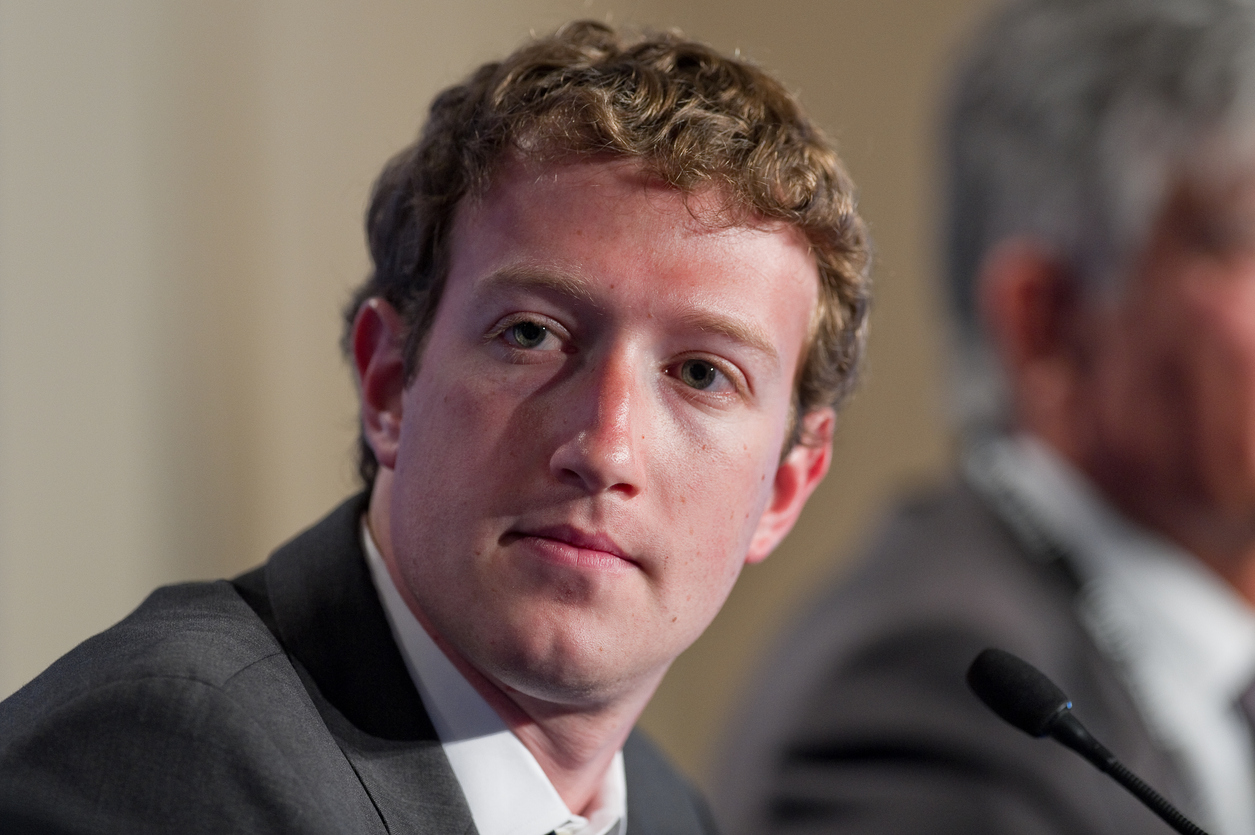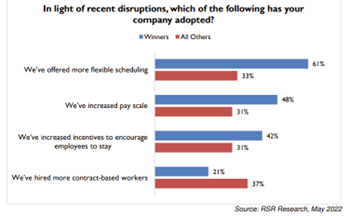Zuckerberg’s harsh message to employees, workers react to EA’s Twitter gaffe
How to support deaf and hard of hearing employees and a new report about employee engagement in retail.

Hi there, comms connoisseurs.
Let’s explore some notable stories from July 4-8, 2022 — and pull out a few timely, tactical takeaways along the way:
1. Mark Zuckerberg to Meta employees: Some of you shouldn’t be here
On an internal call with employees last week, Meta CEO Mark Zuckerberg had some harsh words for employees.
Speaking about what he believes to be an impending economic downturn, Zuckerberg “told Meta’s 77,800 workers that they should prepare to do more work with fewer resources and that their performances would be graded more intensely than previously,” according to The New York Times.
He shared that the company will decrease its hiring targets and pause some recruiting altogether.
“I think some of you might decide that this place isn’t for you, and that self-selection is OK with me,” Mr. Zuckerberg said on the call. “Realistically, there are probably a bunch of people at the company who shouldn’t be here.”
The NYT reports:
In the internal meeting on Thursday, which was held via videoconference, Mr. Zuckerberg’s comments appeared to come out of a sense of frustration, according to one employee who watched the call. After someone asked whether the company would continue having “Meta Days” in 2022, an internal name for paid-time-off holidays, Mr. Zuckerberg paused and mulled aloud about how to answer the question appropriately, said the employee, who spoke anonymously because they were not authorized to speak.
The C.E.O. then said the company needed to crack down and work harder than it had before, “turning up the heat” on internal goals and metrics used to rate employees’ performance. He said he expected some degree of turnover from employees who were not meeting those goals and that some might leave as a result of the intensified pace.
2. How communicators can help deaf and hard of hearing employees
An often misunderstood aspect of DEI strategies is the last letter in the abbreviation: Inclusion.
Inclusion looks different for every organization, but we want to challenge communicators to think about one subset of workers in particular: people who are deaf or hard of hearing.
If your company counts deaf or hard of hearing people among your workforce, it can be easy to burden them with the responsibility of making the workplace accessible.. But as companies have legal and ethical responsibilities to make their digital and physical workplaces inclusive to folks with hearing difficulties, communicators should be on the front lines of these initiatives.
While studies show that most people prefer off-camera virtual meetings, being able to see someone’s face and mouth while they’re speaking is often crucial to helping deaf or hard of hearing people understand and “hear” conversations.
“Today, video calls are common in the hybrid working setup, but there are often a good 20-40% of people who refuse to turn their camera on,” Simon Houghton, founder of organization WeSupportDeafAwareness, told WorkLife. “Others will only put their camera on when speaking. This is okay, but you lose the sense of connectedness when they are not talking and can’t read their body language.”
There are ways comms pros can help make workplaces inclusive for deaf and hard of hearing employees.
WorkLife reports that live transcription services like Otter.ai can enable better understanding of virtual meetings and conferences. But there are other ways, too:
- Ask employees to turn their webcams on when in one-to-one and group meetings with their deaf colleagues
- Include visual aids (charts, photos, to-do lists) with any employee engagement activities and events
- Caption the videos that you provide on internal channels
- Train your workforce on deaf etiquette and best practices
3. EA employees back out of negative Twitter strategy
Gaming giant Electronic Arts (EA) fell into hot water last week when its official Twitter account shared a message belittling people who play single-person games (Wikipedia calls these games “where input from only one player is expected throughout the course of the gaming session.”)
They’re a 10 but they only like playing single-player games
— Electronic Arts (@EA) June 30, 2022
As one might expect, the tweet received many negative responses, including from a major video game streamer:
They’re a 10 but thought this tweet was a good idea
— Jacksepticeye (@Jacksepticeye) July 1, 2022
According to reporting from USA Today’s For The Win, the tweet was supposed to be part of a marketing strategy in which other EA accounts would respond with sassy retorts, generating engagement.
EA employees weren’t exactly on board.
USA Today reports:
“As the negative reactions grew, and more of us began being more assertive, a plan was put together – very haphazardly! – to have other internal studios reply to that tweet,” one of our sources explained. “They were desperately trying to turn things into a positive. Even people working on multiplayer games didn’t like it.”
There was a call to action in the Slack channel featuring an “all hands on deck” plan asking social managers to workshop replies where EA studios would publicly ridicule their publisher online. The idea was to get more attention on the tweet, then use it to highlight some of EA’s single-player games. They wanted to flip the narrative and turn it into a marketing win.
But social media managers from EA’s multiple studios refused, with FTW’s sources saying that multiple managers opted out of the plan immediately.
“The most agreed-on idea was to take responsibility for it and apologize,” said one source.
This controversy is a good example of the blowback that a company can receive when it puts a marketing strategy in place without running it by other deaprtments. While PR decisions should ultimately be made by external communicators, it’s not a bad idea to have internal comms pros consult on some strategies — especially ones that involve multi-department participation. With the inclusion of employee perspectives, gaffes like this one can be easily avoided.
4. Retailers that prioritize employee engagement are more successful, report says
A recent report from Retail Systems Research reveals which worker-focused incentives successful retail companies have implemented since the pandemic.
The report defines companies with sales growth rates above 7% as “winners.”

(Image via)
Sixty-one percent of winning retail companies say they offer more flexible scheduling for employees, while just 33% of all other companies say the same.
Additionally, winners outrank all other companies on things like increased pay scale, incentives for employees to stay and excellent worker pay and benefits. Learning and development is a priority for winning companies, too. Nearly half of winners say they use consumer-grade technology “to maximize employee productivity and engagement.”
“(T)hose wishing to work in retail (and excel there) have their veritable pick of the litter these days,” the report says. “Winners recognize this and act accordingly. As a result, they offer more flexibility into their scheduling AND they use more consumer-grade technologies to make the learning curve associated with using ‘store technologies’ easier and shorter for associates.”
Theses numbers illustrate why the value of employee engagement isn’t limited to white-collar jobs. Workers in other sectors, like retail, manufacturing and food service also benefit from enhanced employee experience tactics — which can increase retention and productivity, and in this case, increase sales as well.
5. How about some good news?
This week, let’s draw inspiration from:
- Fin whale populations have rebounded from the edge of extinction.
- This adorable Wimbledon mural of a young boy from Madagascar named Tefy.
- NPR’s treatise on workplace fashion in the post-pandemic world.
- Ragan Training, which is an incredible resource for communication inspiration and education.
- You also deserve an award. Get your due here!
Take good care of yourselves, comms champions, and keep up the good work.








Hello,
I joined the training workshop with RCG: Writing and Editing for Internal Communicators on June 21, but I was called away to join another call. Is there a PPT and/or recording you can send?
Much appreciated.
Kind regards,
Deborah Hurwitz
Hi Deborah, please reach out to me – justinj@ragan.com and I’ll send it on over!